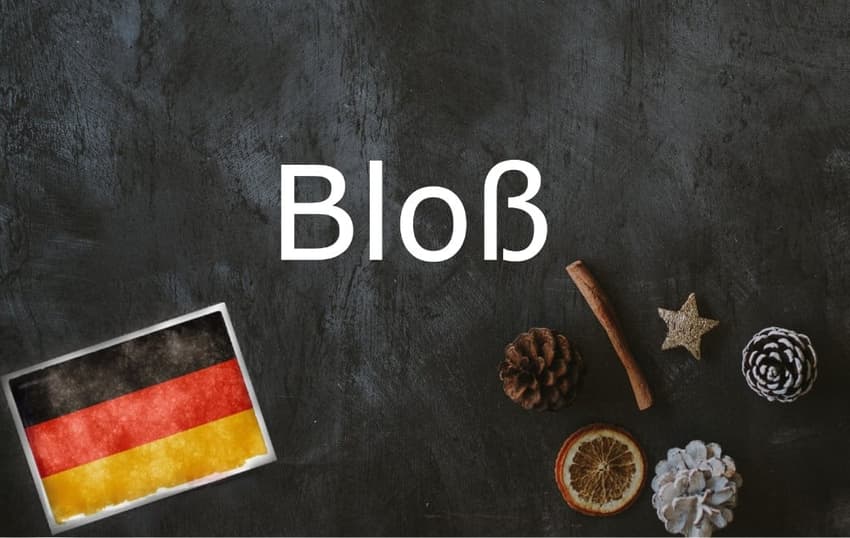German word of the day: Bloß

This fun German word has a myriad of meanings, from describing going sock-less to making a strong statement.
Why do I need to know bloß?
Like many colloquial words in German, bloß is a word you’ll hear everywhere on the streets.
But unlike other filler words like na and halt, it can also double up as an adjective and adverb.
Here’s how it’s used
So what exactly does this fun four letter word mean? In its simplest form it’s a substitute for nur, or only, as in Ich war bloß eine Woche in Köln (I was only in Cologne for a week).
It’s also commonly used in the phrase “not only…but also”, as in Ich war nicht bloß in Köln, sondern auch in Bonn (I was not only in Cologne, but also in Bonn).
READ ALSO: 12 signs you've mastered the German language
When used as an adjective, the little word also mean bare or naked, as in mit bloßen Füßen (barefoot) or mit meiner bloßen Hand (with my bare hand)
You’ll also commonly hear it being used to place emphasis on a statement or exclamation, especially when it’s a negative one. An angry parent might scold their misbehaving teenager with “Mach das bloß nie wieder!” (Don’t you ever do that again!) Or “Komm mir bloß nicht auf die unschuldige Tour!” (Don’t play innocent with me!).
It’s also used to express regret or resignation, similar to its cousin filler word ‘halt’. Lamenting their strong words, the parent might also sigh and say, “Ich hätte das bloß nicht gesagt’ (I shouldn’t have said that).
Someone who’s exasperated about any situation might also utter, “Was soll ich bloß machen?” (What exactly should I do now?") While the sentence can be said without the “bloß”, putting it in there gives an extra punch, showing extra urgency. “Was soll ich machen?” is what you might ask about a house chore, but if you lock yourself out, and no one is around, that “bloß” definitely belongs in the middle.
READ ALSO: German word of the day: Halt
Where does it originate?
While the word is commonly used today, it actually dates back to the Old High German "bloz" and is closely related to the Dutch word "bloot". It has its origin in the Indo-Germanic root "bhel-", which means "to shine" or "to glow", so obviously the meaning has evolved a lot over the years.
Comments
See Also
Why do I need to know bloß?
Like many colloquial words in German, bloß is a word you’ll hear everywhere on the streets.
But unlike other filler words like na and halt, it can also double up as an adjective and adverb.
Here’s how it’s used
So what exactly does this fun four letter word mean? In its simplest form it’s a substitute for nur, or only, as in Ich war bloß eine Woche in Köln (I was only in Cologne for a week).
It’s also commonly used in the phrase “not only…but also”, as in Ich war nicht bloß in Köln, sondern auch in Bonn (I was not only in Cologne, but also in Bonn).
READ ALSO: 12 signs you've mastered the German language
When used as an adjective, the little word also mean bare or naked, as in mit bloßen Füßen (barefoot) or mit meiner bloßen Hand (with my bare hand)
You’ll also commonly hear it being used to place emphasis on a statement or exclamation, especially when it’s a negative one. An angry parent might scold their misbehaving teenager with “Mach das bloß nie wieder!” (Don’t you ever do that again!) Or “Komm mir bloß nicht auf die unschuldige Tour!” (Don’t play innocent with me!).
It’s also used to express regret or resignation, similar to its cousin filler word ‘halt’. Lamenting their strong words, the parent might also sigh and say, “Ich hätte das bloß nicht gesagt’ (I shouldn’t have said that).
Someone who’s exasperated about any situation might also utter, “Was soll ich bloß machen?” (What exactly should I do now?") While the sentence can be said without the “bloß”, putting it in there gives an extra punch, showing extra urgency. “Was soll ich machen?” is what you might ask about a house chore, but if you lock yourself out, and no one is around, that “bloß” definitely belongs in the middle.
READ ALSO: German word of the day: Halt
Where does it originate?
While the word is commonly used today, it actually dates back to the Old High German "bloz" and is closely related to the Dutch word "bloot". It has its origin in the Indo-Germanic root "bhel-", which means "to shine" or "to glow", so obviously the meaning has evolved a lot over the years.
Join the conversation in our comments section below. Share your own views and experience and if you have a question or suggestion for our journalists then email us at [email protected].
Please keep comments civil, constructive and on topic – and make sure to read our terms of use before getting involved.
Please log in here to leave a comment.